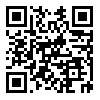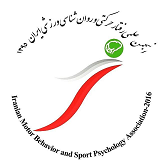Wed, Feb 18, 2026
[Archive]
Volume 2, Issue 4 (11-2020)
IJMCL 2020, 2(4): 10-19 |
Back to browse issues page
Download citation:
BibTeX | RIS | EndNote | Medlars | ProCite | Reference Manager | RefWorks
Send citation to:



BibTeX | RIS | EndNote | Medlars | ProCite | Reference Manager | RefWorks
Send citation to:
Moghadam N, Shahabi Kaseb M R, Stiri Z, Riahi A. (2020). Psychological Skills Profile of Iranian Elite Swimmers. IJMCL. 2(4), 10-19. doi:10.29252/ijmcl.2.4.11
URL: http://ijmcl.com/article-1-84-en.html
URL: http://ijmcl.com/article-1-84-en.html
Assistant Professor in Motor Behavior, Hakim Sabzevari University, Faculty of Sport Science, Sabzevar, Iran , mr.shahabi@hsu.ac.ir
Abstract: (4761 Views)
Background: One of the most important factors affecting the optimal implementation of motor skills and reaching the peak of performance in sports and competitive environments is the use of psychological skills.
Objective: The aim of the present study was to compare the psychological skills of Iranian elite swimmers based on competitive experience, gender, age and swimming distance.
Methods: For this purpose, 93 elite swimmers were selected as available subjects. The Amst 3 questionnaire was used to measure the psychological skills of swimmers and then the findings were analyzed using SPSS software.
Results: The results of independent t-test and U-Man Whitney showed that there was no significant statistical difference between the psychological skills of Iranian elite swimmers based on competitive experience, age, gender and distance of swimming.
Conclusion: It seems that Iranian elite swimmers have learned psychological skills through natural learning, and this has made the level of psychological skills of Iranian elite swimmers about the same. Therefore, the need to use psychological interventions is important for elite Iranian swimmers.
Objective: The aim of the present study was to compare the psychological skills of Iranian elite swimmers based on competitive experience, gender, age and swimming distance.
Methods: For this purpose, 93 elite swimmers were selected as available subjects. The Amst 3 questionnaire was used to measure the psychological skills of swimmers and then the findings were analyzed using SPSS software.
Results: The results of independent t-test and U-Man Whitney showed that there was no significant statistical difference between the psychological skills of Iranian elite swimmers based on competitive experience, age, gender and distance of swimming.
Conclusion: It seems that Iranian elite swimmers have learned psychological skills through natural learning, and this has made the level of psychological skills of Iranian elite swimmers about the same. Therefore, the need to use psychological interventions is important for elite Iranian swimmers.
Type of Study: Original Article |
Subject:
1-3. Sport Psychology
Received: 2020/07/1 | Accepted: 2020/10/5
Received: 2020/07/1 | Accepted: 2020/10/5
References
1. Bohlul, A; Tahmasebi Broujeni, SH; Ezzati, R. (2015). Psychological Strategies Athlete Females and Males in Individual and Team Sports. Sport psychological studies. (12). Pp. 73-84.
2. Esfahani, N; Ghazal Safloo, H. (2013). Comparison of psychological skills of Elite and non-Elite Karate ka and its relation with athletes performance. Psychological studies .No. 1, 09, 110-119.
3. Gaeini, Abbas Ali; Arazi, Hamid; Lari, Ali Asghar; Khaledi, Neda. (2006). Relationship between psychological paremeters of Talent Identification in Swimming , Sprint and Endurance Performance, Of Iranian Elite Swimmers. Psychological Research . (9). Pp. 45-55.
4. Ghadiri, F; Nemati, M; Foroozande, Z. (2018). Psychological sciences. No. (23). 17-34.
5. Jafari, A; Moradi, MR; Rafieinia, P. (2007). A Comparison of psychological skills of Elite and non-Elite Men and Female Taekwondo players. Universal Sport science Journal.(6)32-38.
6. Mihan Doost, Hedayat. (2001). Comparison of psychological skills of Elite and non-Elite volleyball players. Institute of physical education: Tarbiat Moallem of Tehran ( Upbringing the teacher of Tehran University). Movement and Sport Science, 1(2), 70-80.
7. Mirzaee, Bahman; Rahmani Nia, Farhad; Brdar, Farshad. (2007). Comparison of psychological skills of National wrestlers team, in free style and foreign wrestling. Journal of movement, (34) 69-82.
8. Shojaee, M; Danesh Far, A; Rahmati, A. (2010). The effect of age on Freestyle wrestlers' psychological skills. Sport sciences quarterly. Sport Sciences. No. 4, Volume 2, 11-29.
9. Taghian ,F; Bahram, A. (2010). Comparison of psychological skills of Elite and non-Elite female volleyball player. Iranian congresses articles, (2), 72-90.
10. Tojari, F. (2012). Comparison and determination of psychological profiles of Iran's elite male judoka for talent identification and development (TID). Applied Research in Management and biology sciences. (2). Pp. 53-60
11. Zeidabadi, R; Najafipour, F. (2015). The comparison of elite and non-elite martial athletes' mental skills profile. No. 22. Volume, 6. Pp. 67-80.
12. Zeid Abadi, R; Rezayi, F; Motesharrei, I. (2014). Psychometric Properties and Normalization of Persian Version of Ottawa Mental Skills Assessment Tools (OMSAT-3). Sport psychological studies. Sport psychological studies. No. 7, Pp.63-83.
13. Ackland T. (1999). Talent identification: What makes a champion swimmer? The University of Western Australia, Stand alone, 67-74.
14. Adams ,L, B., Smith & Daniel ,E. (1991). A Comparative analysis of Cognitive difference among female elite and no elite high school Field Hockey Players and High School Physical Education Class Non athletes. Master's Theses Department of Physical Education and Sport State University of New York College at Brockport .
15. Anshel, Mark H. (2007). An examination of self-regulatoty cognitive- Behavioural strategies of Australian elite and non-elite competitive male swimmers. physical education & sport sciences, 30(2), 83-78. [DOI:10.1080/00050069508258907]
16. Bagozzi RP. (1992). The self-regulation of attitudes, intentions and behaviour. Social Psychology Quarterly, 55, 178-204. [DOI:10.2307/2786945]
17. Bebetsos, E. (2015). Psychological skills of elite archery athletes. Journal of Human Sport & exercise. 10(2), 623-628. [DOI:10.14198/jhse.2015.102.09]
18. Bebetos,E & Antonious, P. (2003). Psychological skills of Greek badminton athletes. Perceptual and motor skills, 97(3), 89-96. [DOI:10.2466/pms.2003.97.3f.1289]
19. Burton D. (1989). Winning isn't everything: The impact of performance goals on collegiate swimmers' cognitions and performance. The Sport Psychologist, 3(2), 105-132. [DOI:10.1123/tsp.3.2.105]
20. Calmels ,C., Fournier ,J., D'Arripe, F, Soulard, A . (2003). Competitive strategies among elite female gymnasts: An exploration of the relative influence of psychological skills training and natural learning experiences. International Journal of Sport and Exercise Psychology ,1(4), 327-352. [DOI:10.1080/1612197X.2003.9671724]
21. Cox, .H R, Liu Z. (1996). Psychological skills of elite Chinese athletes. Journal of Sport Psychology, 27(2) ,123 -132.
22. Fletcher, DH,S. (2001). The relationship between psychological skills usage and competitive anxiety responses. Psychology of Sport & Exercise. (2), 89-101. [DOI:10.1016/S1469-0292(00)00014-5]
23. Géczi, G., Tóth, L., Sipos, K., Fügedi, B., Dancs, H., & Bognár, J. (2009). Psychological profile of Hungarian national young ice hockey players. Kinesiology, 41(1), 88-96.
24. Gucciardi, DF., Gordon, S, & Dimmock, JA. (2008). Towards an understanding of mental toughness in Australian football. Journal of Applied Sport Psychology .No. 3, volume 20, Pp. 261-281. [DOI:10.1080/10413200801998556]
25. Hale, BD., & Whitehouse, A. (1998). The effects of imagery-manipulated appraisal on intensity and direction of competitive anxiety. Reasearchgate, 12(1), 40-51. [DOI:10.1123/tsp.12.1.40]
26. Hanton, S., & Jones, G. (1996). The acquisition and development of cognitive skills and strategies: I. Making the butterflies fly in formation. The Sport Psychologist, 13(1), 1-21. [DOI:10.1123/tsp.13.1.1]
27. Jannah, M., Mulyana, OP., Muthohir, TC. (2015). Psychological profiles of Indonesian elite swimmers. Malaysian Journal of Movement, Health & Exercise, 4(2). [DOI:10.15282/mohe.v4i2.37]
28. Jones, J., & Hardy, L.E. Wiley, C. (1990). Stress and Performance in Sport. England, Sport & Reaction, 81-106.
29. Kirschenbaum, Daniel, S. (1987). Self-regulation of sport performance. Medicine & Science in Sports & Exercise, 19(5), 106-113. [DOI:10.1249/00005768-198710001-00003]
30. Kizildag, E., Tiryaki, MS. (2012). Imagery use of athletes in individual and team sports that require open and closed skill. Percept Mot Skills, 114(3), 748-756. [DOI:10.2466/05.20.22.PMS.114.3.748-756]
31. Leunes, AD., & J.R. (2002). Sport Psychology - An Introduction of sport psychology, 15(5), 24-40.
32. Marcus, K., Taylor University, Michigan State University & Cristina Rolo University. (2008). Performance strategies of US Olympians in practice and competition. High Ability Studies, 19(1), 19-36. [DOI:10.1080/13598130801980281]
33. Malika, sharma & Lalit, sharma M. (2010). Psychological Skills Differences Between Male and Female Indian Gymnasts. Indian Journal of Physical Education & Sports Sciences, 1(1), 5-20.
34. Munroe-Chandler, KJ., Hall, C.R., Fishburne, G., Murphy, L., & Hall, N. D. (2012). Effects of a cognitive specific imagery intervention on the soccer skill performance of young athletes: Age group comparison. Psychology of sport and exercise, 13(3), 324-331. [DOI:10.1016/j.psychsport.2011.12.006]
35. Patrick R. Young. & Knight, Erin L. (2014) "Use of Psychological Skills by Risk Sport Athletes". Journal of Human Performance in Extreme Environments. 11(2). [DOI:10.7771/2327-2937.1061]
36. Paulo Simões, JV-R., António Silva, Helder, M. Fernandes. (2012). Effects of a Process-Oriented Goal Setting Model on Swimmer's Performance. Human Kinetics, 32(1), 65-76. [DOI:10.2478/v10078-012-0024-6]
37. Thiese, Kaia.E., Huddleston Sharon. (1999). The Use of Psychological Skills by Female Collegiate Swimmers. Journal of Sport Behavior. No. 4, volume 22, P.602.
38. Volp, A., & Keil, U. (1987). The relationship between performance, intention to drop out, & intrapersonal conflict in swimmers. Journal of Sport & exercise Psychology, 9(1), 358-375. [DOI:10.1123/jsp.9.4.358]
39. Weinberg R. (2009). Handbook of sports medicine and science Sussex: Wiley-Blackwell Publishing.
40. Weinberg R., Butt, J., Knight, B. (2003). The relationship between the use and effectiveness of imagery: an exploratory investigation Journal of Applied Sport Psychology, 15(1), 26-40. [DOI:10.1080/10413200305398]
Send email to the article author
| Rights and Permissions | |
 |
This work is licensed under Attribution 4.0 International (CC BY 4.0). |












